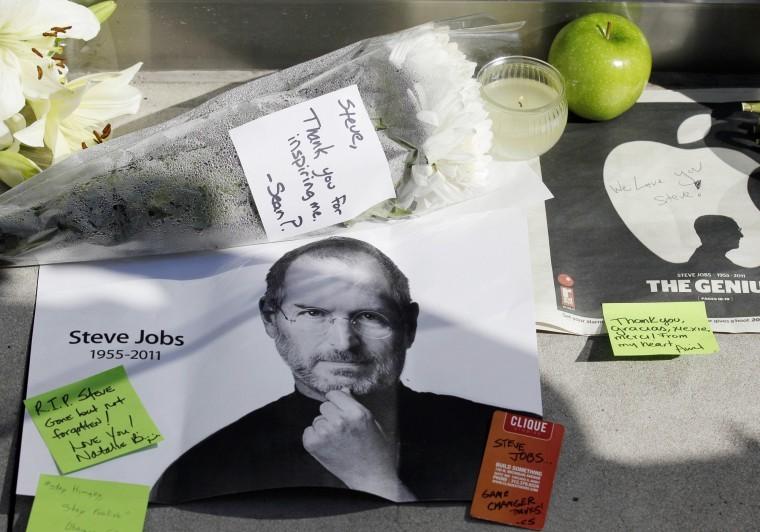Students show mixed reactions to death of former Apple CEO
The Associated Press – Flowers, apples and notes are displayed in tribute to Steve Jobs outside of an Apple store in Chicago, Thursday, Oct. 6, 2011. Jobs, the Apple co-founder and former CEO who invented and masterfully marketed ever-sleeker gadgets that transformed everyday technology, from the personal computer to the iPod and iPhone, has died. He was 56.
October 6, 2011
Facebook and Twitter overflowed with numerous “R.I.P. Steve Jobs” statuses and updates in reaction to the Apple co-founder’s death Wednesday night.
“I was on Facebook and I saw everyone’s statuses saying ‘R.I.P. Steve Jobs,'” said freshman marketing major Jen Mader.
Mader said at first she didn’t believe the statuses were true.
“I Googled him and saw on Wikipedia that he died Oct. 5,” Mader said. “I was kind of sad”
Mader, who owns several Apple products, said she read about Jobs’ death on her Macbook.
“It’s funny I found out through an Apple product,” Mader said. “I love my iPhone, iPod, Mac and everything I’ve ever had with Apple. It’d be a shame if Apple stopped [improving] the way it has.”
On the other hand, there were also students indifferent about Jobs’s death.
“I didn’t really care,” said Eric McCarthy, senior anthropology and sociology major. “I’m not really big on their media players.”
Sophomore nursing major Karla Lara, said Jobs’s death came as a surprise to her despite having heard about his previous health problems.
“I just thought it was terrible since he brought so much technology,” Lara said. “It’s just surprising for him to all of a sudden die. I think he should have come out more and let society know that he had those problems.”
On the other hand, Holly Nicholson, social media specialist of the Communications and Marketing Department. did not find Jobs’s death much of a surprise.
“I knew he had been fighting cancer for many years and many friends and technology experts have commented lately that he did not look well,” Nicholson said. “When he stepped down from Apple in August, I was concerned that it may be health-related. The fact that he died so young was shocking. I did change my Facebook profile picture to the classic rainbow Apple logo in his honor.”
Some also contemplated the future of Apple without its co-founder.
“I don’t think his death will be a setback,” said freshman biology major Rosia Gooding. “The main person is gone, but Apple will still continue.”
Nicholson also has faith in the company despite its loss.
“Steve Jobs built an amazing company full of talented technology innovators, designers and business people,” Nicholson said. “Of course, no one can replace him, but I believe he laid a solid foundation of beautiful and functional design that the company can continue to carry out. I do realize that a company consists of more than one man. He had very talented people working for him who will no doubt continue to create amazing products.”
Computer Science Professor H. Joel Jeffrey found out about Jobs’s death Thursday morning in the Chicago Tribune. Jeffrey said he also was not surprised by Jobs’ death and believes Apple faces drastic changes.
“What Jobs had is something extremely rare in the technical arena: an ability to see what non-technical people will find easy and natural [to] use, and then act on it,” Jeffrey said. “That requires the ability to put yourself in the position of a non-technical person, and very, very few technical people have much of that ability.”
Jeffrey said he does not see a bright future for Apple.
“Apple reflects Jobs’s vision of what makes software good,” Jeffrey said. “But now that Jobs is gone, it will be very difficult for the Apple executives to retain that focus on usability. Without the high-status representative of that perspective and those principles, Apple is likely to see a significant change toward a more ordinary set of corporate principles, such as … rigidity, harder-to-use products, and generally a regression to the mean of ordinary computer companies. It’s not a lock – they could figure out a way to maintain what has made them great – but it will be very difficult.”



